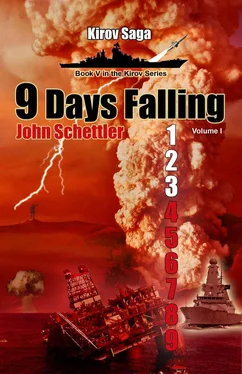Minutes later, they settled into the rear coach, taking the seats in one of two enclosed kupe compartments at the very back near the small rest room. The provodnits, or coach supervisor dressed in plain military garb eyed them briefly, noting Fedorov’s obvious NKVD uniform and rank, and casting a furtive glance at Troyak and Zykov. He said nothing, as if he expected they would take the compartment, and quickly withdrew to the forward coach, wanting nothing to do with these dangerous looking men.
Fedorov gave the passengers in the main coach compartment a cursory glance, but Zykov had already boldly walked the aisle, looking everyone over and making it obvious that he was a security man looking for any possible threats. There were fourteen passengers in the seats, five soldiers who gave them wary looks when they boarded, then settled back into their dozing slumber when they saw that Fedorov in his dark NKVD uniform and cap did not seem to be there in any official capacity. The others were civilians, a line crew of six rail workers in stained grey overalls, and an older couple with a small child. The little girl stared up at the imposing figure of Zykov as he passed her seat, her eyes wide until Zykov winked at her, smiling, which only sent her deeper into the folds of the babushka she was with. Satisfied the coach was secure, Zykov joined Troyak and Fedorov in the kupe , though they left the door open to be wary of anyone who might be moving in the aisle.
The fog was still heavy when the screech of rusty wheels announced their departure and the cars jolted slightly as the brakes were released. The train rolled slowly on through the pre-dawn hour, winding its way north and slightly west to the Amur River. Soon they came to Ussuriysk where the line split off in several branches. They kept to the main spur heading up to Khabarovsk on the longest rail line in the world. It would be twelve hours before they reached that place, some 450 miles to the north, and they took advantage of the dark and quiet to get some food and much needed rest.
As dawn came on what Fedorov figured to be September 23, 1942, he was awake to watch the wan light gleaming off the sallow winding course of the river. Now and again the train would stop at small villages and towns, though there would not be much more civilian traffic on this freight haul. Soon they began to bypass the smaller hamlets, stopping only on the larger settlements where the line crews would exit the coach and mill about the line briefly, checking the ten cargo carriers up to the engine, or looking over rail switch stations before re-boarding. They would ride all day to Khabarovsk, and the sun was already low in the sky by the time they reached the place. The rail workers job there was to replenish the water in the locomotive and restock at the coaling station.
Curious and needing to stretch his legs, Fedorov wandered out to watch them work under the watchful eye of Troyak, who was leaning on the train coach, chewing on something he had fished out of his pack. The rail workers were haggling over the coal with a fat, red nosed man who was holding up his hands in some frustration. Fedorov approached them to see what was going on, noting how the discussion immediately quieted down when they saw him coming.
“What is the problem here?”
“He says the coal is bad,” one man explained. “A workman left the bin doors open and it was drenched by the rain.”
“You mean to say there is no good coal in all of Khabarovsk?”
“Take all you wish,” the fat man offered, much more agreeable now that he spied the NKVD insignia on Fedorov’s cap. “But I am sorry to say it may not burn well for several days.”
Expect the unexpected, thought Fedorov. They could not afford any delay here. He looked about the marshalling yard, seeing several oil stained barrels off by a warehouse. “Are those full?”
The fat man leaned out, squinting at the barrels, nodding in the affirmative. “Yes, oil and lubricants.”
“Take one,” Fedorov said to the rail workers. “Load it at the coaling compartment and oil the coal in a bucket before you put it in the fire box. That should do.”
The workers, hesitated, thinking they might instead enjoy a long break here and mill about the town while they waited for the coal to dry. “We could wait a day, sir,” one man suggested. “It should dry out by tomorrow.”
“We will not wait a single moment!” Fedorov tried to be firm, though he did not present a very intimidating presence. Yet his uniform, insignia and the prominent decorations on his breast cast a long shadow and made him seem much more imposing than he really was. “This train has a schedule to keep,” he said again, tapping his wrist watch. “We must be in Omsk in four days—understand? Now get moving. You men, load that barrel.”
The rail crew knew an order when they heard one. They took pride in their jobs, a special class of skilled labor servicing the steel arteries of Mother Russia. The lead man started off towards the barrels, whistling and waving for two of the others to follow him. He had not expected this NKVD man would be on the train but knew he was going to have to live with him until they reached their destination. Satisfied the men were doing as he wanted, Fedorov walked back to join Troyak.
“Any trouble?” the Sergeant asked.
“The coal will need oiling due to the rain. They were going to wait a day, but we can’t spare any delay. We must get to Omsk on schedule and then we leave the main line and head south to Kazakhstan.”
Fedorov had a lot of time to think things over, wondering what would lie ahead and feeling at times that his plan was completely insane. It was going to be a long journey: two more days to Irkutsk as the line swept north around the wide bend of the Amur River which marked the border with China. They would pass through Chita and Ulan Ude before turning south towards Mongolia where the route would curve beneath the cold banks of Lake Baikal to eventually find the city of Irkutsk. From there it would be another long day to Krasnoyarsk, and then a day through Novosibirsk to Omsk.
They planned to leave the line at Omsk and take a spur heading west through Chelyabinsk to Orsk on the Kazakh border, reaching that place by the 28th. From there they would cross into Kazakhstan and take a local rail line from Aktobe to Atyrau on the north Caspian Sea. At that point Fedorov planned to avoid Astrakhan and go by sea on a trawler or fishing boat, and he had gold in his pocket to secure one if necessary, or Troyak and Zykov to secure what gold would not buy. If all went well they would be on the Caspian coast near Kizlyar by the 30th, but they had no time to loiter or waste along the route.
The coaling incident was a typical example of common delays they might experience. If too many stacked up they would be unable to find Orlov at Kizlyar and would have to look for him at Baku.
Troyak watched the men rolling the barrel on its rim this way and that as they labored to get it near the locomotive. He spat with a grin and strode over to the group of three, waving them aside. Then he stooped down on his haunches, put his brawny arms around the barrel, and lifted it without even so much as a grunt. It was only three quarters full yet must have weighed over 200 pounds. Built like a locomotive himself, Troyak carried it easily to the back of the engine followed by a gaggle of rail workers. He heaved it up on the muddy metal plated flooring of the coaling compartment, and turned, brushing off his rough hands and seeing the astonished looks on the faces of the rail crew.
“Load your coal,” he said curtly, and walked off to rejoin Fedorov. The train was rolling out of the station half an hour later.
On the morning of the 25th of September they caught sight of the crystalline waters of Lake Baikal, one of the most ancient and enduring lakes on earth, over 20 million years old. Holding almost twenty percent of all the fresh water on the planet, the lake stretched in a great cobalt crescent extending some 670 kilometers to the north. The railway had to climb steep ridges on its southern nose, switching back and forth and presenting spectacular views of the lake in all its raw, yet serene beauty. The water was so clear and clean that you could see forty meters into its pristine depths. Even when it froze to a thickness of up to ten meters in winter, the ice still had a glass-like quality of transparency.
Читать дальше












